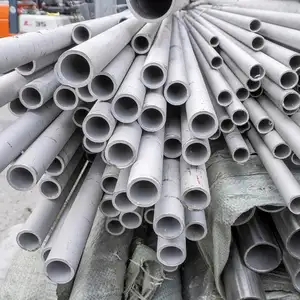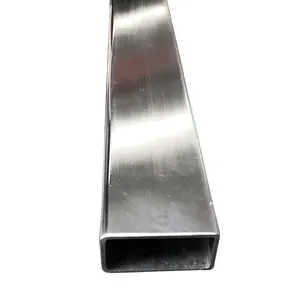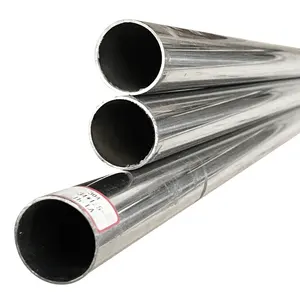Understanding Stainless Steel Pipe Pricing
Stainless steel pipes, cylindrical hollow tubes, serve myriad purposes across diverse industries. Composed of an iron alloy with at least 10.5% chromium by mass, they boast anti-corrosive attributes. The inclusion of metals like nickel and molybdenum further bolsters their corrosion resistance and fortifies their high-temperature resilience. Owing to their robustness and capacity to endure severe conditions, these pipes find extensive use in construction, automotive, manufacturing, petrochemical, and shipbuilding sectors.
Several factors shape the cost of stainless steel pipes, such as the alloy's grade, diameter, wall thickness, and intended use. Production methods, namely welding or seamless processes, also affect pricing, with welded pipes often being the more economical choice for certain uses. Conversely, seamless pipes offer superior uniformity and dependability, which may be critical for demanding applications.
At Kinnari Steel, we prioritize delivering top-tier stainless steel pipes at competitive rates. Our stock encompasses a broad array of dimensions and specifications to meet our clients' varied requirements. Leveraging our proficiency in procuring and distributing stainless steel pipes, we provide tailored solutions for enterprises seeking bulk purchases or specialized pipes for niche applications.
Variations in Stainless Steel Pipe Pricing
Stainless steel pipe costs are subject to significant fluctuation based on key determinants:
-
Grade: Available in a spectrum of grades, including the 300, 400, and 200 series, each stainless steel pipe is designed for specific uses. The 300 series is celebrated for its exceptional corrosion resistance, making it ideal for food processing gear, marine fixtures, and medical apparatus. Its non-magnetic quality also suits electrical applications. The 400 series, encompassing ferritic and martensitic steels, offers reduced corrosion resistance but at a more accessible price point, suitable for automotive parts and domestic appliances.
-
Processing Service: Services such as cutting, punching, moulding, and welding, which can be executed in-house or on-site, are also factored into pricing. These services expedite the end-user's work and ensure the pipe is ready for installation upon delivery.
-
Application: The intended application dictates the specific type of stainless steel pipe required, whether for fluid transport in industrial settings, conveying water or gas in construction, or for structural support in commercial or residential edifices.
-
Material Quality: The stainless steel's purity and uniformity are crucial for its performance in particular environments. Higher-end variants like 316 stainless steel are more suited to harsh, corrosive conditions such as marine or chloride-heavy settings, while lower grades may suffice for less demanding contexts.
Selecting the Appropriate Stainless Steel Pipe Pricing
Choosing the correct stainless steel pipe for your enterprise requires a keen understanding of your project's specific demands. When making a purchase, consider these elements:
-
Material Grade: The chosen grade will affect the pipe's corrosion and heat resistance, as well as its aesthetic. Opt for a grade that matches the environmental challenges it will encounter.
-
Size and Schedule: The pipe's size (diameter) and schedule (wall thickness) should align with your system's specifications. Confirm that the dimensions fit your equipment or can handle the required flow rates.
-
Pressure Ratings: Ensure the pipe's pressure rating is equal to or exceeds the system's operational pressure for safety and longevity.
-
Processing Services: Ascertain whether additional processing services like cutting or welding are necessary, and if the material needs further finishing such as polishing or color coating.
-
Standards Compliance: The pipe should conform to recognized international standards like ASTM or EN for quality assurance.
With Alibaba.com's extensive selection, businesses can make well-informed choices that address their unique requirements.
Alibaba.com's Offerings in Stainless Steel Pipe Pricing
Alibaba.com emerges as a leading global marketplace for those in search of dependable and varied stainless steel pipe options. Its supplier network provides an expansive range of types, from the industrial-grade 300 series to the more corrosion-resistant 400 series, ensuring efficiency and precision for all client needs.
The platform streamlines procurement by presenting crucial product details on each listing page, such as steel grade, processing services like cutting and bending, application fields from construction to oil pipelines, and compliance with international standards like JIS or DIN. This approach allows buyers to make precise decisions suited to their project needs without wading through superfluous details.
Alibaba.com's dedication to secure transactions is manifest in offerings like Trade Assurance, which safeguards payments until delivery is confirmed, providing buyers with confidence when ordering in bulk. The platform's focus on quality assurance and supplier verification also strengthens trust among purchasers seeking reliable products without sacrificing quality. Alibaba.com is the definitive source for wholesale stainless steel pipes, catering to both custom specifications and standard industry requirements worldwide.
Frequently Asked Questions on Stainless Steel Pipe Pricing
What considerations are important when selecting a stainless steel pipe's material?
When choosing a stainless steel pipe, account for the usage environment, necessary corrosion resistance, pressure rating, and aesthetic needs. The material selection impacts the pipe's longevity and robustness.
How does the production method influence stainless steel pipe pricing?
The production technique, whether it's welding, seamless drawing, or spiral winding, affects the pipe's strength, consistency, and application suitability. Seamless pipes typically command a higher price due to their intricate manufacturing process.
What distinguishes welded from seamless stainless steel pipes?
Welded stainless steel pipes are crafted by forming a rolled strip into a tube, offering greater flexibility in size and shape. Seamless pipes, created from solid billets, boast enhanced strength and corrosion resistance.
Is customization available for stainless steel pipes?
Indeed, stainless steel pipes can be tailored in dimensions, length, thickness, material quality, finish, and application to fulfill diverse project requirements.
Are specific stainless steel grades more apt for certain industrial uses?
Certain stainless steel grades are more appropriate for particular industrial uses. For example, 316L is commonly employed in marine settings, while 304 is apt for food processing or water treatment.
What are typical uses for stainless steel pipes in construction?
In the realm of construction, stainless steel pipes are utilized for plumbing, handrails, exhaust systems, structural support, and in various corrosive scenarios.
How should I determine the correct stainless steel pipe size for my project?
To ascertain the appropriate stainless steel pipe size for your project, consider the flow rate and pressure it must accommodate. Focus on the inner diameter (ID) and wall thickness in your selection.
What differentiates non-alloy from alloy stainless steel pipes?
Non-alloy stainless steel pipes, composed solely of stainless steel, are optimal for scenarios demanding corrosion resistance. Alloy stainless steel pipes include additional elements that enhance characteristics like strength or specific chemical resistance.
What steps can I take to verify the quality of a stainless steel pipe?
To guarantee quality, seek suppliers who offer material certifications that detail the grade and composition of the stainless steel in their pipes. Also, prioritize suppliers with a track record of high-quality offerings.
Can stainless steel pipes endure extreme temperature ranges?
Stainless steel pipes are capable of withstanding an extensive temperature spectrum, from cryogenic levels to high-temperature applications, with the specific range varying by grade and type of stainless steel.
What is the importance of surface finishing options like BA, TSHS, or HL?
Surface finishes such as BA (bright annealed), TSHS (temper rolled), HL (hairline), or NL (no lamination) enhance the visual appeal of stainless steel pipes. The selection is based on aesthetic preference and the required finish level.
Do stainless steel pipes offer environmentally friendly alternatives?
Although stainless steel is not typically marketed as eco-friendly due to its alloying components and production process, it is entirely recyclable. Some suppliers may provide eco-friendlier options like green pipe or eco pipe, which have a reduced environmental impact.

































 浙公网安备 33010002000092号
浙公网安备 33010002000092号 浙B2-20120091-4
浙B2-20120091-4